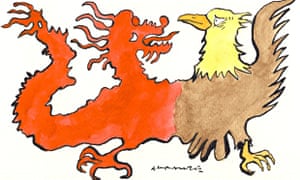
Forget the Brics – America and China will reshape the new world order
Anti-western rhetoric may be loud in Beijing but the Sino-US relationship remains the one to watch
Wednesday 12 November 2014
Was this striking picture meant to symbolise the reshaping of the world?Attending the Asia Pacific Economic Cooperation forum in Beijing this week, Barack Obama wore, along with other participants, a bright purple silky Chinese-style shirt. Here was the leader of the “indispensable nation” dressed in clothes tailored to mirror a post-western world, or rather, a very China-centred environment.
Obama is a president who has, from the start, been very amenable to the notion of global power shifts. Emerging countries have long claimed they have been denied a fair hearing in international affairs. When he first came to office, Obama spoke repeatedly about reaching out to adversaries, nurturing “mutual respect” and repairing the United States’ image. Even his biography pointed to a different way of doing things: a childhood partly spent in Indonesia, where his mother worked on development projects . Obama once called himself “America’s first Pacific president”.
These initial hopes of smooth dialogue to reshape international relations now seem quite distant. We are witnessing a time of multiple crises and much international acrimony. New conflicts in the Middle East and on the European continent, rivalries in Asia, the planet is a mess. It resembles more a Hobbesian vision than anything approaching a Kantian rule-based order. And the American capacity to promote collective solutions has seriously waned.
Resentment at the US and western tendency to dominate the global agenda has rarely sounded so loud. As Obama began his week-long tour of Asia for a series of international summits, including a G20 meeting in Australia, anti-western rhetoric in China is again on the rise. Vladimir Putin claims to be a global shield against American “diktats”. On the face of it, with a weak Europe, and the sense that American might is well-diminished, the Brics, the Brazil-Russia-India-China-South Africa club of emerging powers, should be having a field day.
But beyond resentment at US dominance, what do the Brics really agree on? Some discrepancies are evident in the group. Only one of the nations, China, can claim not to be suffering too much from the economic slowdown. The Russian rouble seems in free-fall. India’s new leader, Narendra Modi, has much on his plate to relaunch economic growth, as has Brazil’s Dilma Rousseff. China and India aren’t exactly historical friends. Nor are Russia and China, despite their latest cooperation on gas. In fact, what stands out the most is how very much China stands in a league of its own. China strives to be the number one global economic power. A free rider in the international order, it wants in time to cash in on its new clout and deal with the US on a an equal, interconnected, basis. Its economy and finances are so entwined with those of the US that its interests do not necessarily coincide with those of the rest of the Brics. Among the Brics it is primus inter pares.I recently attended a dinner with a wealthy Indian businessman who expressed his admiration for Vladimir Putin as a global strategist. Here was someone, he argued, who was intent on restoring the self-esteem of a humiliated nation. It didn’t seem to bother this member of the Indian elite that, by carving out a whole territory by force – Crimea – and annexing it to Russia, Putin has trampled on a much sacred principle of Indian foreign policy, which is state sovereignty and territorial integrity. It reminded me of a conversation I had a few years ago with the Chinese ambassador to a big European country. China, he explained, will restore the global power it enjoyed in the early 19th century, before European nations and America conspired to dismantle it. China has since intensified its claims to islands and large maritime spaces. The Brics summit held in July was all about signalling an end to western control of global affairs.
This hiatus became very apparent to me when I was told of recent discussions involving European, American, Asian and Latin American officials. This was a fascinating window into some of the behind-the-scenes differences that exist among the Brics.
In informal talks, Chinese representatives broke ranks with other non-western officials by giving full approval to the ongoing US war in Iraq and Syria against Islamic State. American interventionism should even entail more boots on the ground, they stressed. They went on to criticise Russia’s annexation of Crimea, saying it had gone too far, and that further Russian military action in Ukraine was unwarranted. They also criticised Brazil’s complacency towards Russia’s attitude, perceived as a nuisance.
China’s priority is not the Brics but what remains the heart of global governance on international security issues, the P5, the five permanent members of the security council (the US, UK, France, China, Russia). It values its position there, along with the wider ad hoc format of the P5+1 (this includes Germany), which has been dealing for years with the Iran nuclear issue.
Indian representatives privately expressed worries that the US-China dialogue could develop to India’s detriment. America would end up being unable to counter Chinese expansion in the region. This, they added, would be made worse if the west pushed Russia closer to China.
US officials were confident that the American economic rebound would strengthen at a faster speed than expected, in part thanks to new energy sources. US global standing would be rebuilt.
The Europeans considered India and Brazil wrong to believe that Middle Eastern actors should be left to their own devices, without outside intervention. If so, Islamic militancy would only become a bigger threat to all. If these discussions are any indication of what the future holds, the new global order will be framed by the US-China relationship. The other emerging powers know it and are obsessed with it. They will scramble to salvage whatever interests and role they can, knowing that they could well end up a sideshow. The US-China relationship is the thing to keep an eye on. Barack Obama wore that silk shirt in Beijing for good reason.

No comments:
Post a Comment
Comments always welcome!